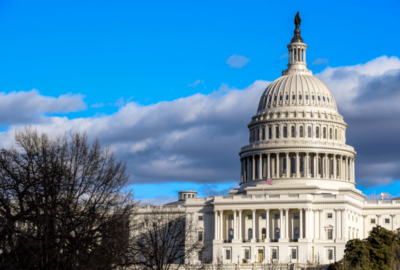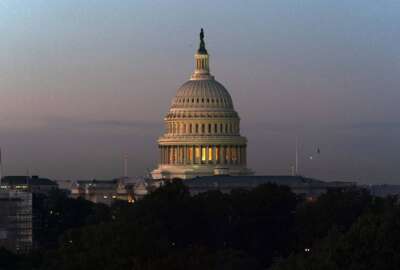The upcoming congressional session is shaping up like the one just ended
Happy New Year. The government-shutdown deadline is just a couple of weeks away. Some things never change. For a deeper look at what a second session of a troubled...
Happy New Year. The government-shutdown deadline is just a couple of weeks away. Some things never change. For a deeper look at what a second session of a troubled Congress is likely to do, the Federal Drive with Tom Temin spoke with WTOP Capitol Hill Correspondent Mitchell Miller.
Interview Transcript:
Tom Temin And this has not been a happy Congress, it’s fair to say.
Mitchell Miller Boy, that is the truth. In fact, last year’s Congress was literally one of the most, if not the least productive Congress ever, the 118th Congress. They only passed 27 bills out of 700 and some that were actually that became into law. Out of more than 700 that were actually passed. There just wasn’t a lot done, as you well know. You had that big period where Kevin McCarthy took 15 votes to get elected speaker. And then you got later when he was ousted as speaker, he had an almost a whole month where they didn’t get everything done. So all of that is backing up and causing us to be in a bad position as we start 2024. I hate to say that as we’re just kicking off the new year, but we’re just over two weeks away from a partial government shutdown. Very possible. A lot of the lawmakers I’ve been talking to think that this is almost inevitable because of this January 19th deadline. The House just didn’t get enough done, and nor did the Senate at the end of the year. And so now we have potentially a big pile up later this month. And then there is a second, as you know, February 2nd deadline, and that could be the entire government shutdown. And right now, the only off ramp seems to be a long term short term continuing resolution, which is a unique proposal by the new House speaker, Mike Johnson, who actually wants to do a or at least floated the idea of a continuing resolution that would go all the way through the end of the fiscal year. Democrats and conservative Republicans have said they don’t want that. So normally you would have some kind of off ramp here where we could get a short term spending plan and then they could work things out. But they don’t even have a topline number for the overall spending for the government. So everybody really thinks that this is going to be crunch time, even in just the first couple of weeks of the new year.
Tom Temin Yeah, with all these factions forming in both parties, it’s starting to look positively parliamentary here.
Mitchell Miller Right, exactly. And you know what’s interesting about the House Freedom Caucus, which of course blocked a lot of the Republican votes last year, literally not allowing them to get to the vote, even though they would be GOP proposals. I’m wondering if they are going to have to rethink some of their strategy, because all through last year, the conservative faction, roughly about two dozen Republicans blocking these overall House Republican proposals that were backed by then House Speaker Kevin McCarthy, they eventually actually allowed more Democrats to vote on some of these measures because that was the only way that they could get spending passed. And so now we’re looking at this situation where everything gets blocked up just by a relatively small group of the 435 members of Congress. Then you complicate that by the fact that the Republican margin has actually decreased because you have George Santos has been kicked out of Congress. Kevin McCarthy, once he was ousted, decided to leave Congress. They only had about a four vote margin already. So now it can get down to close to two votes. And while there is a special election coming up in the Santos race, there’s also another Republican lawmaker who’s getting ready to leave for the private sector. So there’s really a very, very tight, tight rope here that Republicans are going to have to manage. And it’s going to be really a big, big test for the new House speaker, Mike Johnson.
Tom Temin And just to clarify, McCarthy is not leaving at the end of his term. He’s gone now.
Mitchell Miller Right. He’s actually gone now. He decided to leave at the end of 2023. And now there will be a special election to fill his seat. But that’s going to take a while. So those seats are going to remain open for in the McCarthy case for potentially a few months. So this is really going to tighten things up even more so than it’s already been in the House.
Tom Temin We’re speaking with Mitchell Miller. He’s Capitol Hill correspondent for WTOP. Well, they’re not back yet. Right. So what will be the first thing on the agenda, the spending thing? They’ve just got to deal with one way or another.
Mitchell Miller I think that they’re going to have to try to come to some kind of tentative consensus on this topline number for the overall spending, because that’s really the key. And I think that’s going to be the first thing that you’re going to have to tackle. And there really hasn’t been a lot of indications of a lot of negotiating or things happening behind the scenes during the break. Sometimes that happens. As you know, the only negotiating has actually been on something totally separate. And that’s on that supplemental package, which is a whole other can of worms, which is, you know, for Ukraine and for Israel and issues related to the southern border. So it’s going to be a need to get to that topline figure. And then what are they actually going to do? What are what is this conservative group of Republicans going to allow if they’re not going to allow a short term spending? Plan. Then what are they going to agree to? They have given the new House speaker some slack, but I just think that’s going to really tighten as we move forward.
Tom Temin Because they do have in the National Defense Authorization Act, which did get done, the president signed that I think the week before, you know, New Year’s Eve, a spending line for the Pentagon at least.
Mitchell Miller Right. So they do have a debt agreement with the ceiling for the defense spending of $886 billion. That is one bright spot that they did actually get done. They’ve pretty much all agreed on that point. Another bright spot potentially is related to this January 19th deadline. They have what some people say is kind of low hanging fruit in terms of the bills that they need to get passed by that deadline. I was talking with former House Majority Leader Steny Hoyer, the Maryland congressman, and he says there is a potential to get an agreement, at least on that first group of bills. But what he worries about is the second larger group of bills which comes in the February 2nd deadline as part of that so-called laddered continuing resolution. And that’s where there could be a potential legislative train wreck.
Tom Temin From the contractors standpoint, they’re not sure whether they prefer a shutdown or a yearlong C.R (Continuing Resolution).. I think it’s been about 25 years since there’s been a C.R. that cover the entire fiscal year.
Mitchell Miller Right. I think House Speaker Mike Johnson actually surprised a lot of people with floating that proposal because everyone was just assuming that he was going to go either back to the position that Republicans had, which has, as it turns out, has been relatively unrealistic to try to individually pass all of these 12 appropriations bills, knowing that he’s kind of cornered on this group of conservatives who just don’t want a short term spending bill. He thought, well, maybe if I float it through the end of the fiscal year, that will allow them to go along with it. But they have been, as you well know, very stubborn on a lot of these spending bills. And really, this all goes back to last year when that debt ceiling agreement was made by the former House speaker, Kevin McCarthy, with President Biden. This was all supposed to be set up so that if they didn’t reach some agreements, they would have a haircut basically across all the budget. And that would kind of push them into the direction of getting things done. But instead, a lot of conservatives rebelled shortly after that agreement was made. And now here we are with a whole political stew once again heading toward a possible partial government shutdown.
Copyright © 2025 Federal News Network. All rights reserved. This website is not intended for users located within the European Economic Area.
Tom Temin is host of the Federal Drive and has been providing insight on federal technology and management issues for more than 30 years.
Follow @tteminWFED






